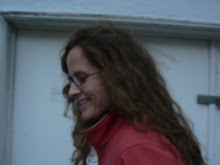Listen to Ana Božičević's "A Summer's Breeze."
I have to stop myself from thinking this poem is circular because of the kind of traveling, the kinds of giving and taking that are happening within the poem. Don't forget that Ana Božičević is to poetry what Jean-Luc Godard is to film. Godard once wrote, "You see someone in the street; out of ten passers-by there is one you look at more closely for one reason or another...A subject will emerge which will be the person himself, his idea of the world, and the world created by this idea of it, the overall idea which this conjures" (Godard on Godard 218). So after dining on a fish, younger and alone and in a varied rhythm, there is still another world climbed to on a tablecloth, the "picturebook" world that we all keep with us as we age, the one of doggie heaven, where loss is "simple," even though we know it's not. "Where is my dog?" and the tablecloths have aged and "my dog" has been replaced by "our dog." Božičević reminds us that the picturebook is for suckers, as is the story of a the fish (reminds me of something Jesusy here), and choirboys are just singin' their poor damn hearts out.
Similar to Godard's style of films about film making, Božičević likewise grabs the collar of her readers and lets them know that there isn't anything she won't do. Godard said that in film, "...everything is always possible, nothing is ever prohibited..." (233). Božičević takes this license in order to ask what really does it mean to believe in someone, to accept someone, to have faith in someone. Božičević declares "...I was you, in Pisa. Now, since you're so smart..." "You" is the reader, is you, is the self addressing the self, is all y'all. She asks us, "do I tell this woman," but we don't answer yet because she/you/me/her has already decided. Several lines later, "I" becomes a choirboy, "That is, I'm you." This flip suggests something of faith, further adventures with "our," accepting the arm, the new dog. It wasn't easy because of the logic, because there is no act of faith that can't be questioned, investigated, and like a summer's breeze or perhaps oscillating fan, it will go gently by and you'll find yourself playing with the new dog once the air has settled.




1 comment:
Farrah, did you know JLG is my fave director and more like a guru, really? Drinks are SO on me. Big hugs and bigger love from Ana!!!
Post a Comment